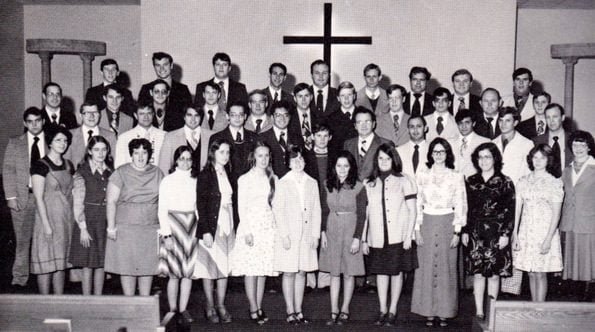Trolls come and go. Over the past fifteen years, countless vile, hateful, violent lovers of Jesus have gone to great lengths to harass me, not only on this blog, but also on social media and by sending me emails. Using fake names, email addresses, and masking their location, these keyboard warriors try to inflict as much psychological harm as possible. Sometimes they change their usernames, hoping I will think they are new commenters. Sometimes this works for awhile, but one thing about trolls, they will always reveal who they really are.
The latest troll to bless us with his presence is Jerry Dee. Dee first commented in October 2021:
“My beliefs began to change in the 1990s, first when I stood against the first Iraq War, and later when I publicly rebuked Jerry Falwell and the Moral Majority for abandoning the gospel for the sake of raw political power.”
The Moral Majority was disbanded in 1989. You “rebuked” them years after they ceased to exist as a group?
Honestly, Bruce, I think that you were just going through the motions…being a “pastor”. Reading vociferously through your blog over the years, you talk about many topics. One subject that almost never comes up is the topic of work. You probably would’ve left the church years earlier had you been one with more ambition and motivation. In all likelihood you may never have went into the “ministry” in the first place. I’m pretty sure you just thought being a “pastor” was something you could do without too much effort.
Just my humble observations.
I replied:
Thank you for pointing out my mistake. I corrected the post.
As for the rest of your comment, it’s evident you have definitely skipped some of my writing. As my wife and children will testify, I was a workaholic for many years, often working 60+ hours a week. Ask my family how little they saw me. You must have missed where I said that I preached 4,000+ sermons, often spending 20 hours a week on sermon preparation. You also missed, evidently, that I planted five churches — not a job for lazy men. And finally, you skipped right over my secular work history outside of the church.
Your comment is a first, Jerry. This is the first time someone has ever said I lacked ambition or motivation. Since you made this comment after “vociferously” reading my blog, I assume you are just trying to be an asshole.
I’ll await your apology.
Bruce
Dee “apologized” by saying:
Apology? You always put yourself first, always.
I’ve read your list of “jobs” many times. When I said that I’ve read through your blog vociferously, I wasn’t jesting.
Would you like to make an additional hundred or so corrections like you just graciously did? How about adding a section to your bio that shows that you’ve quit or failed at almost everything you’ve ever done throughout your entire life, Bruce?
Let’s have a conversation about some other things besides your failed “ministry”:
How’s your photography “business” coming along?
How about the book you’ve been “writing” for the last decade?
Let’s talk about you pathetic social media channels (all failures). Five years on YouTube, 4 crummy videos, 83 subscribers, and zero comments! Just let me know if you would like me to continue to recount more of your online obsolescence.
Now you’re retired…from what? Is Polly retired too? Don’t even bother answering that. You truly are a pathetic failure.
You’ve even ruined your filthy, blasphemous, blog. Your sick, demented mind needs to control every aspect of everything. Instead of having a robust and diverse conversation around your diseased ideas, you ban anyone that you can’t control. The only talent that you have, and I really mean the only one — you are a decent writer.
Full Stop.
BUT, you’ve even managed to get in the way of this with your hunger for control! So, congratulations, big guy, after years of writing you have a following of about two dozen punks, weirdos, and all of them sycophants.
That’s my apology, and You desperately need to get saved!
I replied:
Dear Jerry,
Thank you for being a shining example of the depths of vile moral corruption found in Fundamentalist Christianity.
I have no intent of justifying my life and experiences to you or anyone else for that matter.
You might want to rethink my blog traffic numbers, dude. Thousands of people read this blog. Add up all the traffic sources, this site sees 750,000 to a 1,000,000 page views per year — many of whom are Evangelical and IFB Christians.
I may bump your comments up to the front page. Isn’t that what you really want? You want everyone to know you put the atheist Bruce Gerencser in his place? I may grant you your deep, hard, throbbing desire.
I’m far from perfect. I’ve made lots of mistakes. Unlike you, I don’t go around shitting on people’s doorsteps.
Jesus Fucking Christ, Jerry. Get a life.
This is your final comment. I gave you a chance to be a decent human being. You chose, instead, to attack a man you don’t even know.
Peace.
Bruce
I added:
Jerry,
I should add, if you have vociferously read my writing (and I doubt you have), you have had ample opportunities to engage me and the readers of this blog in thoughtful, robust conversation. Instead, you choose to full-on attack me with your first and last comment. Why is that? You squandered a golden opportunity to advance your beliefs. Instead you decided to be just another example of an asshole for Jesus.
Good job.
Bruce
Dee did not comment again until January 2023. His first response was to Karen, the Rock Whisperer:
Karen,
[derogatory statement deleted]. If you didn’t want your mamas funeral service to be about Christ, why’d you have it at a church?
You could’ve just rented out the local bingo hall and or something. No offense. Just having a hard time wrapping my head around your logic.
I responded, forgetting Dee had been banned:
Evidently, you can’t read: “my parents made their arrangements long before my mother became ill.” This is the same reason Polly’s mom’s funeral was held at a church. Her decision, and we respected it, even though we knew the service would be a hurtful shit show.
Dee responded:
Sir,
Evidently, you must be her [Karen’s] father! Okay, I missed that sentence, but isn’t that for her to point out to me?
You [I guess] deleted my first sentence because it was “derogatory?” That little nothing statement, LOL
! Have you noticed the type of language you use, and the way you speak to people?
Look how you just spoke to victor the troll, you gotta be kidding me!
I responded:
You can run along now. It is evident you have no intentions to play well with others.
Your little statement was offensive, and you know it.
Defending Victor Justice? That’s rich. The guy is a stalker and troll.
You will find I treat people with kindness and respect when they do the same. If not, I am more than happy, praise Jesus, to call them assholes and tell them to fuck off. My house, my rules. Don’t like it? Start your own blog.
God bless, and have an awesome day.
Dee moved on to a new post, Short Stories: Playing the Bruce and Polly Fantasy Game:
Oh brother, this is your worst work yet. Although you’re a nasty bastard to anyone that doesn’t kiss your ample backside, your writing is usually solid. Grow up and be a man, leave this drama for the women and children.
Today, he left the following comment:
I’m not sure who you think you are talking to, Bruce. Are you honestly calling me a coward? Perceiving weakness for meekness is a stupid thing to do. Just what kind of a neighborhood did you grow up in? You wouldn’t run your fat trap for long where I grew up.
You run a public blog, and I thought that I would honestly comment on what I read here. Your regular posters are saying far more insulting things than anything that I wrote. Are you going to remove it? BTW, almost all of them are using “fake” names.
If you are to fragile to handle feedback on the crap that you write, you shouldn’t solicit comments, punk! One thing I can tell you; not one of the deranged freaks making comments to me on here would EVER say these things to my face! And that goes double for you, you bearded face clown!
I could care less if you publish this or not. Just know that I’m telling you that you sound like a little girl trapped inside of a man’s body. And when you, or that sick, hate filled, bimbo is attending a funeral, just sit there and shut your mouth !
Remember you are just a guest in the church. Neither your mother in-law, or that decadent bimbo’s mother, wanted either of you planning their services. By your own admissions, they left explicit instructions for their arrangements that told you both to but out!
I replied:
Oh, I will gladly approve this one.
Your threats of physical violence are duly noted.
My house, my rules. This is not a public site. It is a private blog that the public can read and comment on IF they play by the rules. Don’t like it? Start your own blog. Of course, you won’t do that. That would take work. It’s far easier for you to be a troll, right?
Lots of Christians comment on this site. They gladly play by the rules. They respect that they are guests in my house. If you played by the rules, you would get to comment too.
You are a pathetic, misogynistic man — a true follower of Jesus. Are you a coward? Sure. You hide who you are, and even go so far as to publically attack a dear woman you do not know.
We respected my mother-in-law’s wishes to the letter. We played no part in the funeral. However, no one is going to tell us how we should feel or respond, especially someone like you.
Please work on your grammar and spelling. They are atrocious.
Is Jerry Dee actually a new troll? Maybe. Some of his comments have a Victor Justice vibe. It could just be Justice trying to find a new avenue to comment. I do know Dee and Justice use the same VPN service. Regardless, much like Justice, Dee is permanently banned. I reserve the right to post their comments from time to time if I think they could be instructive or entertaining. I would love either of them to explain these Bible verses in relation to their conduct on this site:
- Therefore if any man be in Christ, he is a new creature: old things are passed away; behold, all things are become new. (2 Corinthians 5:17)
- But the fruit of the Spirit is love, joy, peace, longsuffering, gentleness, goodness, faith, Meekness, temperance: against such there is no law. And they that are Christ’s have crucified the flesh with the affections and lusts. If we live in the Spirit, let us also walk in the Spirit. (Galatians 5:22-24)
- Let no corrupt communication proceed out of your mouth, but that which is good to the use of edifying, that it may minister grace unto the hearers. (Ephesians 4:29)
- Ye have heard that it hath been said, Thou shalt love thy neighbour, and hate thine enemy. But I say unto you, Love your enemies, bless them that curse you, do good to them that hate you, and pray for them which despitefully use you, and persecute you; That ye may be the children of your Father which is in heaven: for he maketh his sun to rise on the evil and on the good, and sendeth rain on the just and on the unjust. (Matthew 5:43-45)
I won’t hold my breath. One thing is for certain, Jerry Dee, Revival Fires, David Tee, and countless others like them don’t really love Jesus and practice his teachings. They use their faith to cause harm. In their minds, I am, along with the readers of this blog, just enemies to be vanquished.
Bruce Gerencser, 68, lives in rural Northwest Ohio with his wife of 47 years. He and his wife have six grown children and sixteen grandchildren. Bruce pastored Evangelical churches for twenty-five years in Ohio, Texas, and Michigan. Bruce left the ministry in 2005, and in 2008 he left Christianity. Bruce is now a humanist and an atheist.
Your comments are welcome and appreciated. All first-time comments are moderated. Please read the commenting rules before commenting.
You can email Bruce via the Contact Form.
Share This Post On Social Media:











